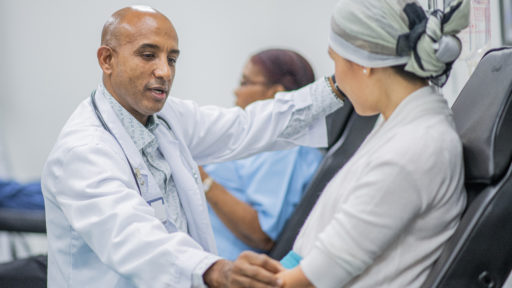What is palliative care?
Palliative care is care given to improve the quality of life of patients who have a serious or life-threatening disease, such as cancer. Palliative care is an approach to care that addresses the person as a whole, not just their disease. The goal is to prevent or treat, as early as possible, the symptoms and side effects of the disease and its treatment, in addition to any related psychological, social, and spiritual problems. Palliative care is also called comfort care, supportive care, and symptom management. Patients may receive palliative care in the hospital, an outpatient clinic, a long-term care facility, or at home under the direction of a physician.
Who gives palliative care?
Palliative care is usually provided by palliative care specialists, health care practitioners who have received special training and/or certification in palliative care. They provide holistic care to the patient and family or caregiver focusing on the physical, emotional, social, and spiritual issues cancer patients may face during the cancer experience.
Often, palliative care specialists work as part of a multidisciplinary team that may include doctors, nurses, registered dieticians, pharmacists, chaplains, psychologists, and social workers. The palliative care team works in conjunction with your oncology care team to manage your care and maintain the best possible quality of life for you.
Palliative care specialists also provide caregiver support, facilitate communication among members of the health care team, and help with discussions focusing on goals of care for the patient.
What issues are addressed in palliative care?
The physical and emotional effects of cancer and its treatment may be very different from person to person. Palliative care can address a broad range of issues, integrating an individual’s specific needs into care. A palliative care specialist will take the following issues into account for each patient:
- Physical. Common physical symptoms include pain, fatigue, loss of appetite, nausea, vomiting, shortness of breath, and insomnia.
- Emotional and coping. Palliative care specialists can provide resources to help patients and families deal with the emotions that come with a cancer diagnosis and cancer treatment. Depression, anxiety, and fear are only a few of the concerns that can be addressed through palliative care.
- Spiritual. With a cancer diagnosis, patients and families often look more deeply for meaning in their lives. Some find the disease brings them closer to their faith or spiritual beliefs, whereas others struggle to understand why cancer happened to them. An expert in palliative care can help people explore their beliefs and values so that they can find a sense of peace or reach a point of acceptance that is appropriate for their situation.
- Caregiver needs. Family members are an important part of cancer care. Like the patient, they have changing needs. It’s common for family members to become overwhelmed by the extra responsibilities placed upon them. Many find it hard to care for a sick relative while trying to handle other obligations, such as work, household duties, and caring for other family members. Uncertainty about how to help their loved one with medical situations, inadequate social support, and emotions such as worry and fear can also add to caregiver stress.
These challenges can compromise caregivers’ own health. Palliative care specialists can help families and friends cope and give them the support they need.
- Practical needs. Palliative care specialists can also assist with financial and legal worries, insurance questions, and employment concerns. Discussing the goals of care is also an important component of palliative care. This includes talking about advance directives and facilitating communication among family member, caregivers, and members of the oncology care team.
When is palliative care used in cancer care?
Palliative care may be provided at any point along the cancer care continuum, from diagnosis to the end of life. When a person receives palliative care, he or she may continue to receive cancer treatment.








